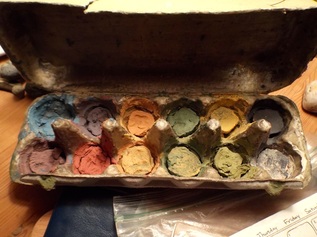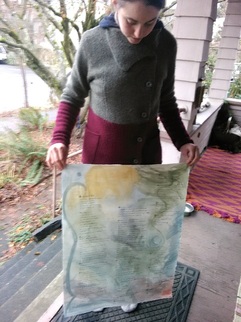A common question to artists, tending to be asked by "non-artists". It's really the first line to a never-ending cosmic joke as we're all artists in one way or another and at some level we know that really it took us every moment of our life up to now to be ready to create what it is we're examining this question by. Be it a poem, a clay pot, or a house, there's a level of time not measured when you take into account all of its story and our attentive thoughts to its creation, and all its iterations.
As an example, I will use a poem called "Don't Miss Out" I wrote in October.
Chapter Style!!!! (You can also use the fancy yellow box on the right side of the screen -->)
Part 1, The Idea
An overall theme gets stuck in my mind.
One sensory-rich memory lingers right on the edge of having words.
The Poem "Don't Miss Out" probably truly started in 2010 when I became aware of the concept "Fear Of Missing Out" -- FOMO -- which I noticed made people I knew arrive late for one thing to leave early for the next, never settling into their experience in any given situation. (I know it is not always the case for attending many things: that one always sacrifices their presence. Only was my observation from that time - when I felt the FOMO notion was ridiculous).
Parts of this poem started to live in snippets in a document "Don't Miss Out" on my desktop in September as I was traveling in Oregon.
Parts of it started to live in my now-exposed addiction to swimming in very cold rivers.
I was at a dance in Olympia, on my way back North, and one song actually had the words "Don't Miss Out"; it struck me.
There was another, separate doc called "I don't care about politics" that started when elections began to get closer. -- And the bit about friends being advisors I had woken up thinking about one morning before the Incident with the Tree.
Part 2, The Moment It's Real
All of a sudden, it's there. A dead mossy tree. It is significant, standing in the throat of a green tunnel that opened up in the forest along the road, and hit me square in the heart. I "knew" instantly that it was a poem, standing there with soft green moss all over it - already its own syllables of rainforest loveliness and eeriness and interest. What I DIDN'T know, which I almost never do when these things hit, was that the poem in this case, was in fact, "Don't Miss Out", the poem that had been rolling around in my mind for nearly six weeks. What I really didn't know, was that this other "don't care about politics" poem was also the same. And it was the moment with the dead mossy tree that made me sit down that evening and write it.
Read: The moss made me do it.
Read: The newts made me do it.
Part 3, Writing (Do It)
Part 4, Editing
I write the thing and post it on Facebook after little more than a spell check. About half the time - and in the case of "Don't Miss Out" - I'm actually writing it in my Facebook Status Update. Why? I'm not really sure. Because the header is a picture on the farm I worked in for four years. A place I love more dearly than I can express. It's a consistent "virtual office" that exists anywhere in the world there's internet enough to get to the crazy blue and white Facebook world, and it used to be the only place I published my writing at all.
I follow the same sorta-slip-shoddy post-and-editing style for these blog posts.
I edit, I move things around, I change words, usually the next day.
Not much change other than errors. But if you thought you read it differently yesterday, you're probably right. I'm no professional.
I post immediately because otherwise I wouldn't. The next day, sometimes I wake up in the morning wondering if I really "got it right". Second-questioning if it's my story or the poem's story. Second-questioning if the essence is there for-true. If the picture is the right one that matches the Moment. And the next day I wake up, and read it more than once. And as the week goes on, I read it often. And I'm always surprised and honored by the words.
Every now and again, I edit something several months old.
I'm a little bit of a perfectionist. I keep going back.
Yet, the essence of the poem never changes, even from when it was felt, before words. I can never change it more than to clarify one word here, a little punctuation there... never big changes. Ever! If I tried, then poem would say, "Nope."
I felt a lot of relief after I wrote "Don't Miss Out". I don't think I'd really held on to an idea for such a long time and truth be told, I felt a little cynical about its origin because in a way it was a retaliation on the life I was witnessing around me during my time in Oregon. I felt like in a way I was bragging, proud of my life, and in a way I was begging, wishing more people felt proud of theirs, and overall I didn't really like it! Ha!
So there was some editing about my feelings about it that happened in the aftermath too, because I think I feel my own cynicism more than anyone else can. In any case, when it was done, I felt like I could "move on". And it grew on me.
Part 5, New Territory
A friend invited me to an open mic at The Boiler Room. Whoa. I'd never read my poetry out loud before. Really, I hadn't even been reading them out loud to myself. The idea had started to trickle in my mind maybe three months prior, and I learned about a few open mics in town. With an invitation? I printed out a few and figured that when I went, I'd feel into which ones wanted to be shared.
I read a short poem about how rainy it had been that day, and then I read "Don't Miss Out", and another one I wrote for my cousins in Bend. People's reactions were very heart-opening. I returned the next week and read another poem. I was getting pretty high from all the sharing, and also from listening -- I enjoy open mics for their diverse swath of community talent. It's very touching. I was excited to share more places. My friend is the coordinator for "First Friday Story Night" and there's a rule about "oral tradition only" for the open mic portion. That means no reading. I asked if there was any exception? She said no.
Okay. The Boiler Room was easy in a way because I didn't think many people I knew would be there. Mostly strangers? Awesome. First Friday Story Night is a lot of my community. Scarier. Memorizing? Never my forte. Remember the previous chapter about writing? The words come and they go and how in the world was my mind gonna go back and take in their exact order more slowly? I'd never memorized a poem before. Well, I could pick a short one, and I could do that for my first time.
Guess who wanted to be memorized? You got it, 3 pages of "Don't Miss Out".
The long poem I didn't even really like. I tried to think of doing others, but they weren't the One.
I recorded myself reading it -- a couple times, so I wasn't memorizing by too many stutters -- and listened to nothing else for a week straight. By the day of, I had it! I did it at least 5 times without the recording.
Although things did not go so smoothly at the mic, it was still received with a standing ovation, and I was flushed with greater than ever appreciation for the words.
I'd NEVER done that before.
Now, I read poems out loud when I write them. The Atmosphere seems to like it.
I read them to friends, too.
Part 6, What Cannot Be Known (Ripples)

In College, my 2012 thesis was titled "Placemaking and the Ripple Effect of Community Organizing and Sustainable Culture Building" ... and in those days I was astounded continuously by how widely and deeply Placemaking projects effected people, and these days I am astounded still by how widely and deeply our little every-day actions give us tools and inspire others.
May 2014, it's two days before Portland Village Building Design Course and I need paints for our rock painting exercise. My friend Cait emerges from the basement with this gem:
created by our friend and stellar natural builder, August "Auggie" Mann. I've done the rock painting a lot of times with acrylic paint... these are even better. Straight up clay and pigments, in an egg carton painted on the interior with beeswax. The paint will exist on the rock until it rains. It will inspire the student to check on it, wonder what's happening to it, as the weather washes it. Their art is ephemeral. Lovely while it's there, inevitably melting. Forever reverberating with their care and attention. The perfect pair to my paintbrushes, added to the VBDC-teaching-toolkit.
(As a side, I notice no difference in the level of effort put out by the students if they know the paint is clay or acrylic -- whether it will wash away or not, students always make them beautiful.)
Fast forward, November, I'm passing through Portland and it's my mentor, Mia Van Meter,'s birthday and we go out to coffee, walking in the cold-cold to the nearest neighborhood corner-shop. We spend a bit of time talking about her "Solar Returns" astrology chart -- which is a planetary map drawn up for someone's birthday giving a tone for the year -- generally catching up, singing songs back and forth to each other. Somewhere along the way the bit in "Don't Miss Out" about asking your friend for advice comes up. I ask, "Do you want to hear the whole poem? (since now I have it memorized!) it will take me 5 minutes to recite it." She does. I do.
And she wonders, "You don't like it??"
I grin, "Well, I do. I feel hot from the inside whenever I speak it. And it makes me all jittery."
This week, Mia declares that she has a wonderful Solstice present for me, however, it requires my help. I say I'm game. The vision: very light watercolour background, blueish-green, "Don't Miss Out" printed over it. Mia's bought special thin watercolour paper that will fit in a printer. She's inspired.
Part 7, Painting
[Editing, Part 2]:
For the following hour, I lightly coloured the white edges.
Part 8, Hand-Writing
We let it sit for a couple days.
Mia's oldest son suggests we measure the paper and count the number of lines in the poem and be more mathematical about how it will fit. This is eventually how we come to the layout,
and how I come to be on the floor of a former City Repair co-conspirator's office, before lunch on Christmas Day, with a drawing pen in hand (a summer gift) and the watercolour background taped to the floor.
It takes me exactly two runs through Emancipator's album "Safe in the Steep Cliffs" to write it all.
Part 9, To Be Breathing

This poem, all the poems, live and breathe a life of their own. Some of them want to be shared more widely. Others come and go quickly. I read them all over and over again trying to understand my experience in the world, always feeling so grateful for the array of emotion they each Remember for me, and share outwardly.
There are many stages to this story, full of things I'd never done before. In writing this post, I also learned new things. I had never made navigation like I used for this blog post. Never made a floating menu to the side. Living, breathing, learning system, all depending on what is inspired.
Part 10, How Long Does It Take?
A thought strikes me, "You know that funny question people ask about How Long it Takes to make something? Like how long does it take to do the watercolour and write the poem?"
We banter a few moments on the topic, covering all the bases I outlined in this post:
Within each chapter of this post, there is a measurement of time. But... does it even make sense to add them? What do you get when you add four years, plus an instant, and fifty+ rounds of 4 minutes and 56 seconds? This post took five hours, and I know I'll edit it later. Never mind the age of rocks and forests that retain themselves as characters within the poem.
...and she finally concludes, "So, about four hours."
"Right!" I pretend to calculate, "Now, twenty bucks an hour and... done!"
We laugh. Can't measure Love.

 RSS Feed
RSS Feed
